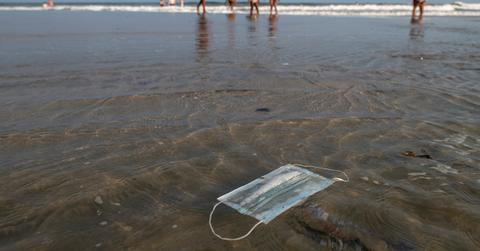An Estimated 1.5 Billion Masks Have Entered Oceans In 2020
Dec. 28 2020, Updated 2:41 p.m. ET

While masks and other protective items have been vital in the fight against COVID-19, they can have an incredibly detrimental impact on the environment. According to some estimates, humans globally use and dispose of an estimated 129 billion face masks and 65 billion plastic gloves every month.
Inevitably, some of those items will end up in our oceans, where they can wreak havoc on the marine ecosystem. And according to a recent report by conservation organization OceansAsia, the number of face masks that made it into the planet's oceans this year may be as high as 1.5 billion.

The organization based its estimate on 52 billion masks being manufactured in 2020, with a conservative loss ratio of 3 percent. Plastic masks can take hundreds of years to break down.
“The 1.56 billion face masks that will likely enter our oceans in 2020 are just the tip of the iceberg,” Dr. Teale Phelps Bondaroff, Director of Research for OceansAsia, said in a summary of the findings. “The 4,680 to 6,240 metric tonnes of face masks are just a small fraction of the estimated 8 to 12 million metric tonnes of plastic that enter our oceans each year.”
“It is critical that we work to reduce our use of single-use plastics, and we all have a role to play,” Phelps added. “There are reusable and sustainable options for almost every single single-use plastic item. Please wear a reusable mask, unless absolutely necessary, and be sure to dispose of all masks responsibly."
“Hygiene concerns and greater reliance on takeaway food has led to increased use of plastics, particularly plastic packaging,” Gary Stokes of OceansAsia added. “Meanwhile, a number of measures designed to reduce plastic consumption, like single-use plastic bag bans, have been delayed, paused, or rolled back.”
“Marine plastic pollution is devastating our oceans," Stokes continued. "Plastic pollution kills an estimated 100,000 marine mammals and turtles, over a million seabirds, and even greater numbers of fish, invertebrates and other animals each year. It also negatively impacts fisheries and the tourism industry, and costs the global economy an estimated $13 billion USD per year.”
OceansAsia encourages people to use reusable face masks whenever possible. When this is not possible, such as in a healthcare setting, more must be done to ensure proper disposal of single-use masks. The organization is also encouraging governments to do all they can to prevent masks from entering the oceans.
The World Health Organization recommends that people wear reusable cloth face masks when going out in public. Cloth masks can be cleaned and worn repeatedly, reducing the amount of trash you produce. If you need to wear a single-use mask for work or because you are sick or are caring for someone who is sick, please ensure that you properly dispose of the mask in a trash bag that will be knotted up — click here for more tips on safely disposing of face masks to ensure they don't hurt wildlife or the environment.
The best way to prevent contracting or spreading coronavirus is with thorough hand washing, social distancing, and wearing a cloth face covering. If you feel you may be experiencing symptoms of coronavirus, which include persistent cough (usually dry), fever, shortness of breath, and fatigue, please call your doctor before going to get tested. For comprehensive resources and updates, visit the CDC website. If you are experiencing anxiety about the virus, seek out mental health support from your provider or visit NAMI.org.